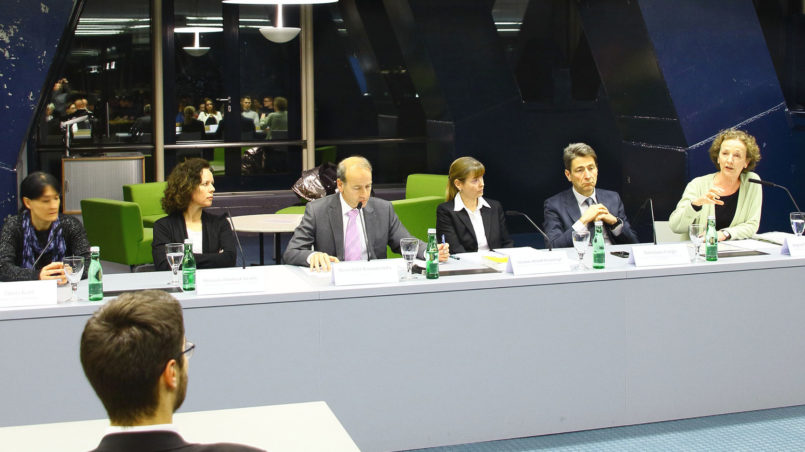Sexual Assaults – and the Impact of Laws on these Violations

The hashtag “#MeToo” triggered a broad social discussion about sexual assaults. But what possibilities do victims have to defend themselves juridically? This question was the subject of a panel discussion in the series of events, “Rechtspanorama”, of the daily Austrian newspaper, “Die Presse” on January 22, 2017, in the Vienna Juridicum under the title “#MeToo – how does the law help?” (Translation of: „#MeToo – wie hilft das Recht?“)
Ingrid Nikolay-Leitner, head of the Vienna Equal Treatment Attorney’s Office, explained in her opening statement that the main problem with harassment and attacks at the workplace was the intimidating working environment: As a rule, perpetrators exploit an existing clear power gap. The equal treatment lawyer’s office has the task of providing assistance in cases of sexual harassment in the workplace. The “Equal Treatment Act for the Private Sector“, which came into force in 2004, offers the possibility of a large differentiation of sanction measures – and also the chance to resolve less serious conflicts discreetly, without arousing public interest.
Michaela Windisch-Graetz of the Institute for Labour and Social Law at the University explained that the Equal Treatment Act should offer legal protection in the world of labour. It is designed to be markedly low-threshold: on the basis of this law, for example, offensive jokes or wolf-whistling could be sanctioned – in criminal law this threshold is much higher. The Equal Treatment Act allows victims to claim damages in the event of misconduct by an employee of the company, but also in the event of misconduct by a customer of the company, provided that the employer becomes aware of this and does not take any action against it, which particularly relates to the gastronomy sector.
Chris Karl, a forensic psychologist, addressed sexual assaults in the world of sport, such as those brought into the public discussion as result of the accusations brought by the former ski racer, Nicola Werdenigg1.
Potential perpetrators intentionally chose the field of sport because the specific circumstances, such as joint training visits, make it particularly easy for them to approach children sexually. However, the assaults do not occur suddenly; rather, the perpetrators usually build up a relationship of trust with their future victim, but also with his or her parents, over a longer period of time. This process, called “grooming“, often takes years and is carried out systematically and with planning by the perpetrators. When it comes, usually very late, to the actual sexual assault, the perpetrator is often already “preparing” his next victim.
The legal problem lies in the fact that only the actual sexual abuse is punishable, but the preceding long-term grooming process cannot be punished under criminal law. Criminal law can, therefore, only intervene when it is already too late. In addition, the victims face the big problem of having to accuse someone who is often popular as a trainer:
Nobody likes to talk about sexual harassment. Adult women find that very difficult, and children even more so.
Susanne Reindl-Krauskopf, a lawyer at the Institute for Criminal Law and Criminology at the University of Vienna, also pointed out that criminal law has the function of an “ultima ratio” and can therefore only be used in cases of serious violations. She criticised section 218 of the Criminal Code, which only came into force in 2016 and which punishes unwanted sexually motivated contact: “The facts of the case are formulated far too vaguely here.” For example, it is not clearly defined at which areas of the body a touch is still to be tolerated and at which areas it is no longer acceptable. The impediments to a conviction are far too high – and if it comes to a trial, but not to a conviction, the impression always arises that the perpetrator has done nothing illegal.
Nikolaus Forgó of the Institute for Innovation and Digitization in Law at the University of Vienna (translation of: “Institut für Innovation und Digitalisierung im Recht der Universität Wien“) sees the #MeToo campaign predominantly positively, because it drew attention to a problem that had been little known until then: “There is incredible emancipatory potential within social media.”
However, legal claims on the Internet are generally difficult to enforce because of their internationality and widespread anonymity, and the protection of victims is a complicated challenge here. However, this also applies in the reverse case, i.e. if someone is accused of an attack without justification: the public stigmatisation as a sex offender is a very big problem for the persons concerned because it can hardly be stopped.
Asked whether the legal remedies take effect too late in practice, Ingrid Nikolay-Leitner from the Equal Treatment Attorney’s Office replied that when sexual assaults in companies became known, the victim was usually removed from the department or the company in the past. “This no longer exists, companies are dealing with the problem much more intensively.”
The psychologist, Chris Karl, sees the perpetrator-victim reversal also as a massive problem in the area of sport: “The sympathies are always with the perpetrator and not with the victim. If you rebel against a coach, you’re considered a nest-polluter.” As a result, athletes will almost always only publicly denounce cases of abuse once their active careers have ended anyway. After all, the sports associations’ awareness of the problem has changed significantly. Today they are trying to apply clear rules as preventive measures:
For example, there is a six-eye principle, which means that coaches and athletes should not be alone with each other. This alone could avoid many suspicious situations and protect not only potential victims but also trainers from false accusations.
During the discussion, it was repeatedly stressed that laws against sexual assault are a good remedy but cannot solve the problem alone. Susanne Reindl-Krauskopf summed it up with the sentence: “Society should recognise that not all problems can be solved at the legal level.”
The current social discussion was finally assessed as positive, for example by Michaela Windisch-Graetz: “‘#MeToo’ can offer opportunities to question the hierarchies of power that are ultimately the reason for the attacks.” The psychologist Chris Karl takes a similar view: “There is now a chance to change structures.”
Translation German-English: Anna Dichen
_
1 https://uk.reuters.com/article/uk-austria-skiing-abuse/tyrol-to-investigate-allegations-of-sexual-abuse-in-austrias-ski-scene-idUKKBN1DZ33O
Credits
| Image | Title | Author | License |
|---|---|---|---|
 |
00_VA-Sexuelle Übergriffe_Martin-Krake_CC-BY-SA4.0- | Martin Krake | CC BY-SA 4.0 |
